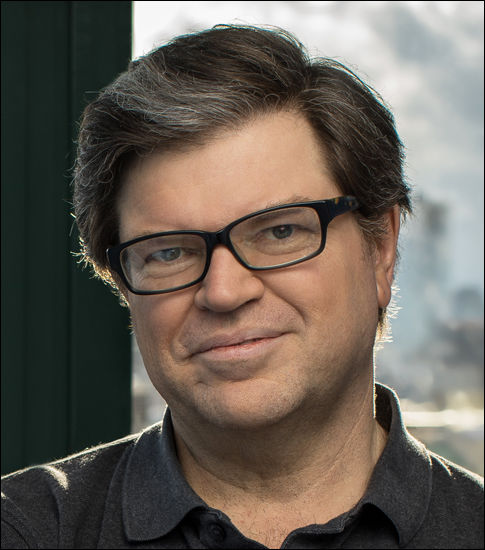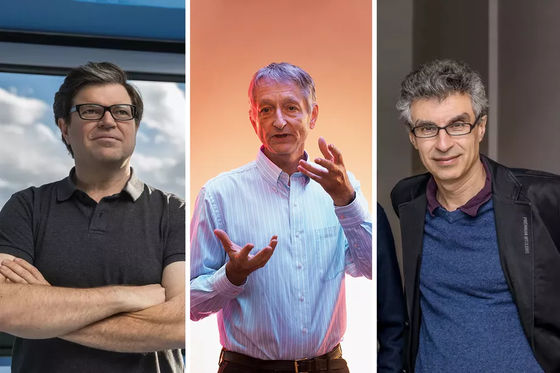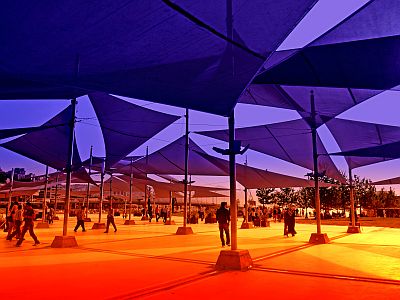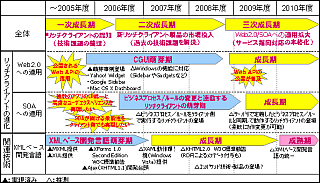The 2018 Turing Prize winner, also known as the Nobel Prize in Computer Science, is determined

by Joshua Sortino
The 2018 Turing Prize winner has been determined to be awarded to those who have made innovative achievements in the computer science field. The 2018 Turing Award winners are presented to three researchers who have laid the foundation for the recent artificial intelligence (AI) boom.
2018 Turing Award
https://awards.acm.org/about/2018-turing

Turing Award 2018: Nobel Prize of computing given to 'godfathers of AI'-The Verge
https://www.theverge.com/2019/3/27/18280665/ai-godfathers-turing-award-2018-yoshua-bengio-geoffrey-hinton-yann-lecun
Turing Award Won by 3 Pioneers in Artificial Intelligence-The New York Times
https://www.nytimes.com/2019/03/27/technology/turing-award-ai.html
The 2018 Turing Prize winners are Yoshua Bengio , Geoffrey Hinton and Yann LeCun . All three are called 'the father of AI', and have been awarded the Turing Award for recognition of their achievement in developing Deep Learning, which has recently received particular attention in the AI field.
Bengio, a professor at the University of Montreal, is the person who launched an AI-related company called Element AI .

Hinton is a researcher who continues AI related research at Google and the University of Toronto

LeCun is the chief AI scientist on Facebook and a professor at New York University.

The technology developed by the three in the 1990s and 2000s has attracted great attention in the fields of computer vision and speech recognition in recent years, and is used in various AI technologies such as automated driving cars and automatic medical diagnosis. For example, a face recognition system for unlocking a smartphone, and an AI function that automatically predicts email replies are technologies based on algorithms developed by three people.
'This is a great honor, as great as going into the computer science field, and is as good as being able to win with my friends Yoshua and Geoffrey,' said LeCun against The Verge, a foreign media. I also feel that it's wonderful. '
'Deep neural networks are one of the biggest advances in computer science of today,' said Jeff Dean, head of the AI department at Google. At the heart of this progress is Yoshua Bengio, the winner of this year's Turing Award. There is a basic technology developed by Mr., Geoffrey Hinton, and Mr. Yann LeCun. '

The AI boom and its hype-like issues are as old as the AI discipline itself. If research can not meet the overblown expectations, it will reduce research funding and interest. Such a phenomenon called 'AI's winter' seems to have already been in the late 1980s. However, since the period of winter called AI, three researchers have been working on the development of neural networks that have become one of the important components of modern AI. Looking back on that time, 'from the mid 1990's to the early 2000's when it was not possible to present research on neural networks because the community has lost interest, it was a dumb moment,' LeCun said. Is speaking.
A movie about Hinton's talk about next-generation neural networks has been released on YouTube in 2007, a stage well before the arrival of the recent AI boom.
The three thought they needed to rekindle the public's interest in AI, and they secured funding from the Canadian government to support interrelated research. Using the funds, LeCun said, 'We have held regular meetings, workshops, and summer schools for our students.' It seems that a small AI community explosively growing was born around 2012 and 2013, and the current AI technology is based on the steady efforts of the three people who did not give up AI. I can hear you.
During this period, three showed that neural networks can achieve powerful results in tasks such as character recognition. However, until 2012, when the research team led by Hinton adopted the famous AI benchmark called 'ImageNet', other research areas were not attracting attention. Hinton et al.'S team has developed an object recognition system with a high accuracy of 41% using neural networks in the field of object recognition where other researchers could only improve function little by little until then I was attracted attention by doing.

The low cost processing power of GPU and abundant digital data are fuels in these fields, and the basic techniques in the AI field including back propagation and convolutional neural networks that were developed by three people from 2012 onwards It seems to have spread widely.
Existing AI systems require large amounts of data to understand the world, and may be easily fooled, so they are only suitable for specific tasks. But LeCun is optimistic about AI's prospects. 'Even if we can use new methods to create intelligence at the human level, we will probably need to go over 50 more mountains (disabilities), including the unseen ones. We are the first to We just climbed a mountain, 'says LeCun, who will need the efforts of many researchers for the ongoing development of the future.
Related Posts:







